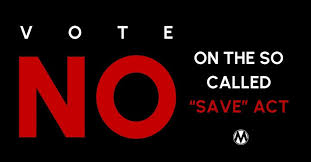Voter “Safe Act”-You Will Need a Passport or Birth Certificate To Vote- House of Representatives Should VOTE NO!
Safe Act Implications (to be voted on by House of Representatives on April 3)
You will need to prove US citizenship- Passport (43% of Americans have passports), Birth Certificate, or Naturalization Certificate to vote
Driver’s Licenses (except enhanced driver’s license/real ID which are only available in five states), Military and Tribal ID’s would not be sufficient to prove citizenship
Can Not Vote by Mail– affects seniors, disabled and rural area voters- 7 million people
End Voter registration drives
Eliminates online voter registration– 11 million people
Impacts significantly 60 million people who live in rural areas
Supposedly, this is because Trump claimed without evidence that he lost the popular vote to Hillary Clinton because 2.9 million undocumented immigrants voted. Evidence showed it was 30 incidents.
But if we explore further- it will keep those who didn’t vote for Trump or GOP from voting- women, minorities.
Election officials are everyday Americans who work hard to ensure a functioning democracy. However, under the SAVE Act, election workers could go to prison for up to five years if they help to register somebody without the correct documents, even if the registered voter is a citizen.
People of color, married people who have changed their names, as well as young and elderly people are more likely to have difficulty in accessing these documents. For example, married people who have changed their name do not necessarily have a birth certificate with their current legal name on it.
Married Women. Around 80% of American women change their name upon marriage. As a result, roughly 33% of all married women lack documents that meet citizenship requirements and reflect their current legal name.5,6 Married women make up over a quarter of the electorate, so impeding them from registering to vote has a potentially significant impact on election outcomes.
Elderly registrants. In 2020, 14.10% of survey respondents 80 years old and older reported that they lack access to documents proving citizenship.7 In 2022, older voters (defined as age 65+) were 28% of the electorate.
Young voters. In the same study, 24.34% of 18-29 year olds reported that they lacked documentation.8 State-level data matched that finding. Young Texans aged 18-29 are three times more likely to have trouble accessing their documentary proof of citizenship than older Texans (13% vs. 5%). Georgians aged 18-29 are twice as likely to lack access to documents than those 30 or older (16% vs 8%).
Hispanic voters. In recent case studies in Texas and Georgia, Black and White voters had nearly identical rates of DPOC access (10% in Georgia and 5% in Texas), but Hispanic voters were less likely to have accessible DPOC (16% of Hispanic Georgians and 8% of Hispanic Texans).
Lower-income voters. In Texas and Georgia, voters making less than $50,000 per year are less likely to possess identity documents than their higher-income peers. Voters making less than $30,000 per year are even less likely to have required documents.
Active duty military personnel and their families. Active duty military personnel and their families move every 2-3 years on average, and would thus continually have to conduct in-person transactions to register in new locations.
Current Laws Make it Illegal to vote for Non-US Citizens
Federal law already clearly states that it is illegal for non-U.S. citizens to register to vote or cast a ballot in federal elections. It’s an existing crime that is punishable by up to five years in prison.
Election officials also already use state and federal data—including citizenship data from the U.S. Department of Homeland Security and the Social Security Administration—to verify an individual’s eligibility to cast a ballot.
There are already documentation requirements to be able to register to vote. As required by federal law, Americans must provide either the last four digits of their Social Security number or their driver’s license number on a voter registration application in order to provide election officials with the necessary information to verify their identity and voting eligibility.
Solution Suggestions- Institute for Responsive Government
Electronic verification with existing federal and state databases would provide a secure, efficient way to confirm eligibility while streamlining the verification process for voters and election officials alike
The best way to ensure clean and accurate voter rolls is by fully funding federal election grants established by the Help America Vote Act (HAVA).10 These grants have historically enjoyed bipartisan support, and are the only federal support state election officials receive to improve their voter registration systems, strengthen list maintenance processes, and ensure compliance with federal mandates. Further, full funding would allow election officials to tackle decade-long maintenance backlogs and update equipment that leaves us vulnerable to cyberattacks from adversary nation states like China and Iran.








